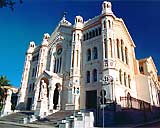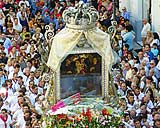Reggio’s wealth
The most important symbols of reggina’s culture and history are
collected in the city centre.
The Archeological Museum of Reggio Calabria was instituted in 1882,
originally as a municipal museum. Its building was built under a
project by the architect Marcello Piacentini in 1932, but remained
unused during the war and through the postwar. In 1955 was partially
opened to the public. It has many sections: the prehistorical
collection, the locrese section, the section dedicated to the greek
colonies in Calabria, the numismatic section and the archeological
skin-diving, that since 1981 is home to the famous Bronzi di Riace,
precious witnesses of bronze greek sculpture of the V cent. B.C.,
and the Philosopher’s Head of Porticello, found in a wreck in the
depths of the sea in the area of Porticello of Villa San Giovanni.
The National Museum, waiting for a municipal art gallery to be built,
is also keeping the Municipal Museum collection, that is made of
operas that go from the 700 to the 900, amongst which is possible to
find the operas of Domenico Genoese and Monsolino-Lavagna-De blasio
and the small wooden paintings by Antonello Da Messina. On the via
Reggio Campi, at the back of the church San Paolo alla Rotonda there
is the Small Museum San Paolo, born from the artistic passion and
the will of Mons.Francesco Gangemi. It’s home to various objects of
sacred art from around the world, icons that go back to the
byzantine and norman time, silvers and paintings.
The construction of Reggio’s Cathedral goes back to the foundation
of the Church by San Paolo. On the main altar, from September to
November, the painting of the Lady of the city, the Madonna della
Consolazione, is displayed.
Among the chapels inside the cathedral of great value is the one of
SS. Sacramento with its inlayed marble walls, realised in 1539 by
the bishop Agostino Gonzaga. On the main street, Corso Giuseppe
Garibaldi we find the Municipal Theatre “F.Cilea”, opened in 1931,
and that since the 60’s has welcomed the most famous theatre and
opera companies. Closed in 1985, was then restored and given back to
the city in 2003, and it has today a full season of music, ballet
and theatre.Patrona Festival
“Today and always: long live Maria” is the cry of the “carriers”,
that condense the devotion of the people of Reggio for the Madonna
della Consolazione. A consolation, that as meant in the bible, is
aid, assistance, help. The painting that represents her was done by
the reggino painter Nicolò Andrea Capriolo in 1547, and blessed by
the archibishop Agostino Gonzaga in the following year, inside
Reggio’s Cathedral. Since then a tradition full of faith and popular
participation exists. Famous are the fact that firstly linked the
reggini with the Madonna della Consolazione, during pestilence,
epidemics and earthquakes. It is notorious that on the 24th of May
1657, with a notarial act signed by Cristoforo Latella , Reggio
undertook to offer a festival every year on the first saturday after
the 8th of September. In this occasion 100 men at a time carry the
Holy Image from the Eremo church to the Cathedral, where it remains
untill the 21st of November , festival for the presentation of the
Beata Vergine Maria when it’s carried back to the Eremo.
 |
|
 |
| Reggio Calabria’s Cathedral |
 |
|
|
| Detail of the Madonna procession |
 |
|
|

